
Pages:
<< Back 1
2 3
4 5
6 7
8
9 10 Next
>>
A
number of interdisciplinary courses were introduced either through
the cooperative efforts of two or more departments or under the
auspices of the ongoing General Studies program. The establishment
of the Experimental Curriculum in 1966 also encouraged the faculty
to try out new ideas for course offerings.
In 1970 the faculty approved another experimental project called
the Liberal Studies program, under which up to 50 selected freshmen
were permitted to choose, with the advice of a faculty counselor,
an individualized course of study without following the normal graduation
requirements. This program was carried out from 1971 to 1974.
In 1967 the university initiated an African Studies program at the
urging of President Kerstetter, who had recently visited several
countries in that continent and advocated DePauw's assuming a special
academic interest in that part of the world. The first director
of the program, anthropologist Svend E. Holsoe, established an African
anthropological museum in the basement of Asbury Hall and published
the Liberian Studies Journal from his DePauw office. His successors,
historians Walter T. Brown and John E. Lamphear, expanded the program
to include on-campus institutes and study tours in Africa.
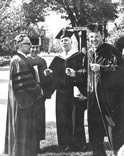 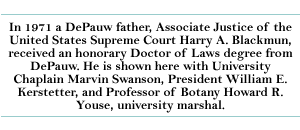
To encourage the study of Africa, Asia, Eastern Europe, and Latin
America the faculty also adopted a non-western graduation requirement
and began to add more courses in the history, language and literature,
and general culture of those areas. Chinese, Japanese, and Swahili
were taught for several years, and growing numbers of foreign students
and visiting professors were brought to the campus.
To help achieve the administration's goal to offer every student
an opportunity to become acquainted with another part of the world,
a greater variety of foreign study programs was made available.
In addition to DePauw's own two
Contemporary Europe Semester programs, one based in Freiburg and
the other in Vienna, and the Mediterranean Studies program based
in Athens, there were several GLCA-sponsored programs located in
Africa, Colombia, Hong Kong, India, Japan, Scotland, and Taiwan.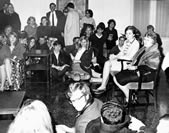
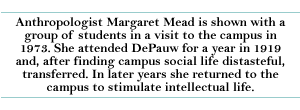
DePauw students also had the option to enroll in a foreign university
on an individual basis or participate in an overseas program administered
by another institution. Though not everyone took advantage of these
opportunities, a large majority of the student body participated
in some kind of off-campus educational experience, either abroad
or in one of the various domestic programs located in New York,
Philadelphia, Washington D.C., Oak Ridge (Tennessee), and other
cities.
An interdisciplinary program in Black Studies was inaugurated in
1972, with an area major available in that field by the following
year. With the aid of a grant from the Lilly Endowment a special
program entitled Careers in Business and Public Service came into
existence in 1973 under the direction of the economics and business
department. It consisted of a set of core interdisciplinary courses
plus specific offerings related to five career options: business,
public administration, institutional management, mental retardation
and mental health training, and musical arts management. Each student
enrolled in this program also participated in a supervised field
internship.
The university sponsored several academic symposia in various fields
during these years, including one held on Old Gold Day weekend in
October 1972 to celebrate the 100th anniversary of the birth of
the distinguished historian Charles A. Beard. Both he
and co-worker, Mary Ritter Beard, were native Hoosiers and Phi Beta
Kappa graduates of DePauw University.
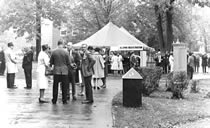 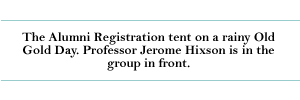
Some changes were effected in departmental organization including
the elimination of the home economics and secretarial science departments.
Anthropology was added to the title of the sociology department
and economics became economics and business. Similarly earth sciences
replaced the former departmental title geology and geography, while
classical languages was renamed classical studies.
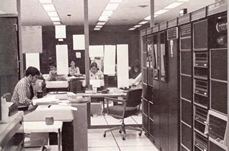 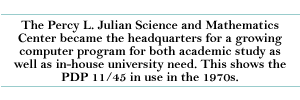
In 1974, after having begun to offer courses in digital computers
shortly after the establishment of the university's Computer Center
a decade earlier, the mathematics and astronomy department incorporated
computer science in its title. The next year the speech department
became the department of communication arts and sciences.
The aerospace department was discontinued in 1973, when the federal
government withdrew the Air Force R.O.T.C. program because of lagging
enrollments and budgetary restraints. Three years later, however,
the university was able to make arrangements with the Air Force
department at Indiana University for DePauw students to enroll in
aerospace courses on the Bloomington campus. A similar arrangement
was made a year later with the Army R.O.T.C. unit at Rose-Hulman
Institute in Terre Haute. The Army eventually sent an R.O.T.C. detachment
to Greencastle to offer basic military courses on the DePauw campus.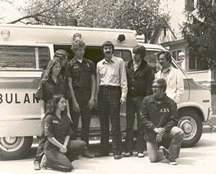
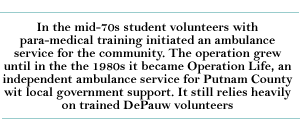
The
administrative offices also underwent a series of title and personnel
changes, partly directed toward strengthening public relations and
fund raising. In 1966 Norman Knights was named assistant to the
president for planning and development, and Robert Crouch became
vice president for development. After Crouch, an indefatigable fund
raiser for his alma mater, retired in 1970, the former Air Force
R.O.T.C. commander, Frederick Sanders, became director of development.
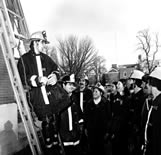 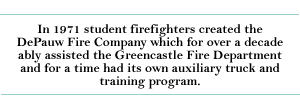
From 1969 to 1973 Knights served as executive vice president with
broad responsibilities for the non-academic aspects of the university.
James Cook was made associate director, then director, of alumni
services; Patrick Aikman, director of publicity and the news bureau;
Glenn T. Job, director of publications; and Marian Hoffman Maloney,
assistant editor (later editor) of university publications.
In 1967 William Wright succeeded Riggs as dean of students. Oliver
C. Rice came in 1969 as an assistant to the dean of students with
additional responsibilities in the admissions office related to
the recruitment of minority students. A new associate dean of students
in 1971 was Brian R. Enos. The retirement of Value Williams in 1972
brought in Eleanor Sisson Ypma as registrar, the first in that post
to possess a doctorate. Dr. Roger E. Roof succeeded Dr. Arthur W.
Smith as university physician and director of health services in
1966.
Back
to Top
Pages:
<< Back 1
2 3
4 5
6 7
8
9 10 Next
>>
|












